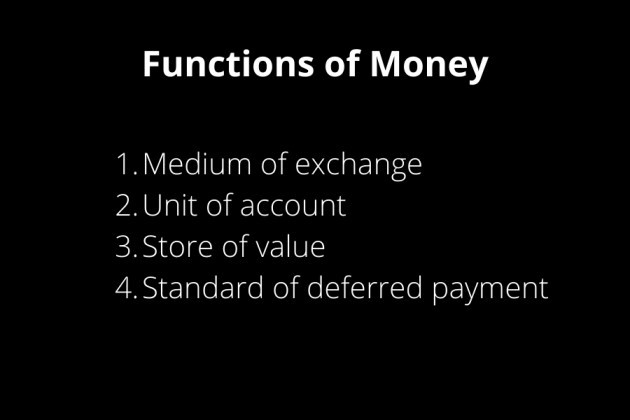The main functions of money are defined as medium of exchange, unit of accounting, store of value, and sometimes, a standard of deferred payment.
What is money: Money is something that everyone utilizes. We all desire it, work for it, and consider it. Money is the means by which we obtain the things we need and desire, despite the fact that its formation and expansion appear to be somewhat ethereal.
In other words, Money is a medium of exchange in the sense that we all agree to accept it in making transactions. Merchants agree to accept money in exchange for their goods, employees agree to accept money in exchange for their labor.

Function 1: Medium of Exchange
People used to barter to get the goods and services they needed before finding a means of exchange. Two people would get into a trading arrangement if they each had certain things that the other desired. However, this early form of barter lacks the transferability and divisibility that make trade efficient.
Nowadays, a medium of exchange means that we trade money for the transaction of all goods and services. This eliminates all of the issues related to the barter system.
Functions of Money 2: Unit of Accounting
Money, as a unit of accounting, provides a straightforward means of recognizing and conveying value.
Money is used to measure and record financial transactions as well as the worth of goods and services generated in a country through time, according to the implication.
For example, when we go to the shop and ask the seller ‘how much is that bicycle?’ He says It will be $200. This is easy to understand. Then we go to another shop and ask ‘how much is that bicycle?’ After that, the seller replies as it will cost less than a piano but more than a wheelbarrow.
Comparing those two incidences we can understand that without a unit of accounting, it would be difficult to process and communicate value.
Function 3: Store of value
Money is a store of value because it allows us to keep the results of our effort or business in a useful medium. To put it another way, money allows us to save the worth of a long, hard week’s labor in a neat little stack of cash.
How would we save away the income we get for later use if we didn’t have money?
Money must maintain its worth over time in order to function as a medium of exchange. As a result, it must be a valuable store of value.
Money isn’t the only means of storing value. Because money drops in value with inflation. It may not even be the best store of value.
On the other hand, money is more liquid than most other stores of value since it is widely accepted as a medium of exchange. Money is also a useful store of value that can be quickly transferred and comes in a variety of amounts.
Functions of Money 4: Standard of deferred payment
This means that money functions as a’standard’ for future payments. If money may be used to make purchases now, it must also be possible to make purchases that will be paid for later.
Loans and future agreements are expressed in monetary terms. Also, the standard of deferred payment is what helps us to purchase goods and services today and pay later.
For example, if we borrow money from someone, we must repay both the principal and the interest amount at some point in the future. This function has made borrowing and lending easier. It has also resulted in the establishment of financial institutions.
Money fulfills all of these functions: it is a medium of exchange, a store of value, a unit of account, and a deferred payment standard.
Key Characteristics of Money
- It must be able to stand the test of time.
- It is easy to transport, convenient, and simple to use
- It may be divided into smaller amounts.
- It is difficult to forge or copy
- It typically maintains its worth throughout time
- It must be widely accepted by the general public.
Summary: Functions of Money
- Medium of exchange: Money avoids the problem of a barter system to trade goods and services. A double incidence of wants between the two persons engaged in a transaction is required for barter systems to work.
- Unit of account: Anything that helps in the representation of a thing’s worth in an understandable way and the comparing of the value of other items.
- Store of value: Anything that is “valuable” and can be used now or in the future. Its value can be reclaimed at a later date. As a result, people may be able to save money today in order to spend it later.
- Standard of deferred payment: This is a way of showing the value of debt. If someone borrows today, they will be able to repay their loan in a way that is acceptable to the person who made the loan in the future.
Related Articles
Money Neutrality: Definition, Conditions, Super-neutrality
Top 10 Importance of Studying Macroeconomics
Barter Definition
Did I miss anything?
Please share your thoughts in the comments section below.


